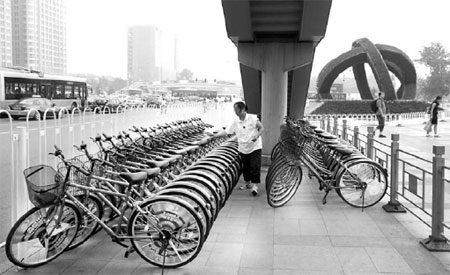 |
|
A worker looks at rental bikes in downtown Beijing. Bike rental companies have reported brisker business after the alternating odd-and-even car plate rule was adopted to curb traffic. [Xiao Cun/China Daily] |
Taking inspiration from the "green" Olympics, which begin on Friday, a growing number of Beijing residents are opting for two wheels over four.
Many are dusting off their old bikes, while others, especially fashionable yuppies, are thronging to department stores and bike shops to snap up flash new models. In addition, a large number are renting before buying, to make sure the bikes are right for them.
Once the predominant mode of transportation in the country's cities, the bike is making a comeback, and vendors have reported a sales surge over the past several months.
The Emmelle specialty shop in Caishikou has extended its opening hours to 9 pm from 6 pm because slews of customers are going bike shopping after they clock out at work. The store's sales have increased several times in the past several months.
"We are selling an average of 20 bikes every weekday," Beijing branch director Pan Gongcun said. "We can sell twice as many on weekends."
Many shoppers drive to Pan's store in their cars. Most are well-off, aged in their 30s and 40s, and prefer high-end bikes with frames made of exotic composites coated in thick layers of lacquered paint. Such models typically go for about 5,000 yuan ($730) before extras, such as headlights and reflectors.
Younger cyclists are opting for mountain bikes with at least 10 gears. This demographic is also fussier about the design and color scheme, and most seem to have a penchant for crimson red and bright yellow, Pan said.
Estimates put the number of bicycles zipping around the capital at the end of 2007 at about 8 million - a figure most believe has grown to more than 10 million by now, including hybrids powered by rechargeable batteries.
An ordinary bike costs about 300 yuan in China and such models abound at neighborhood supermarkets.
At the Carrefour outlet in Zhongguancun, also known as China's "silicon village", Lao Pan and his small sales team are busy leading customers through row upon row of shiny new bikes. Summer is usually the peak sales season, but the showroom is particularly busy this year.
"We sell 40 to 50 (bicycles) on a normal day," Pan said. On weekends, "we usually move more than a 100 of different types (of bicycles)".
Pan explains the technologically savvy "wiz-kid" types often prefer collapsible bikes that can be folded up and carried around. These models weigh an average of 10 kg and cost about 500 yuan.
Foreigners often prefer electric bicycles. "We have foreign customers buying four or five electric bikes in a single purchase," Pan said.
Many recent converts to the cycling world prefer renting to buying. Xin Xiaolin, an IT professional in Beijing, said that rather than driving to work as he used to, he now cycles to the subway station.
But rather than buying his own bike, he rents one from a Beijing Bicycle Rental Services outlet by the nearest subway station to where he lives.
"I don't want the hassle of owning a bike," he said.
Founded in 2005, Bicycle Rental now has about 70 outlets in Beijing proffering a fleet of 7,000 bikes. It runs a shop near every major subway station, bus stop and famous tourist site. Customers can return the bike at any one of the company's outlets irrespective of from where it was rented.
Rentals cost 10 yuan an hour, in addition to a 400-yuan deposit returned to the client when they return the bike. However, discounts are available for longer rentals, and according to the firm's founder and chairman Wang Yong, a bike can be rented for an entire year for 100 yuan, which works out to 27 fen per day.
In anticipation of the influx of foreign visitors expected to descend on the city for the Games, the company is running a bilingual hotline for customers who don't speak Chinese.
(China Daily August 5, 2008)